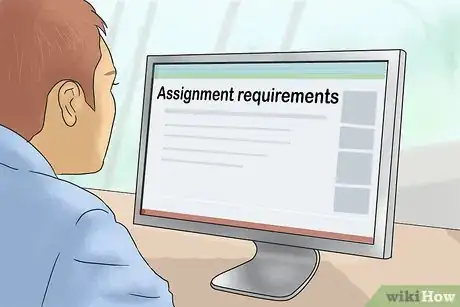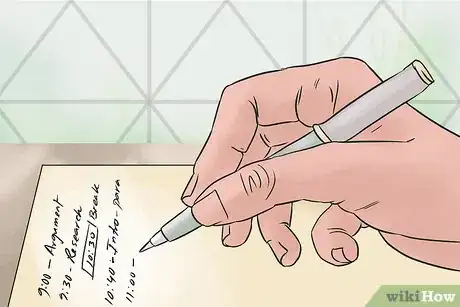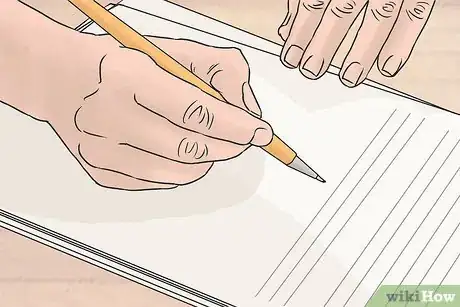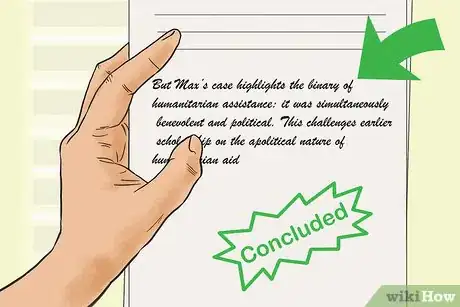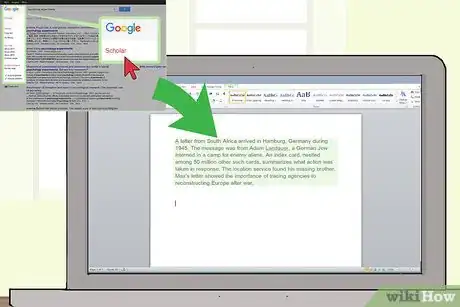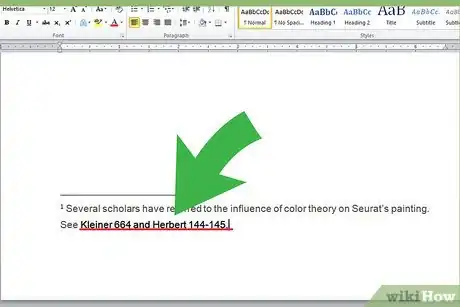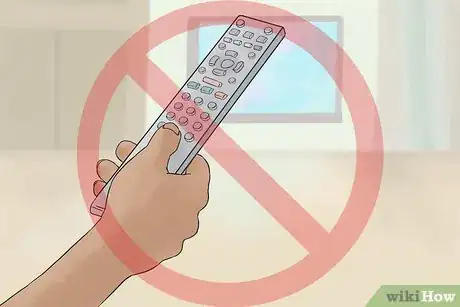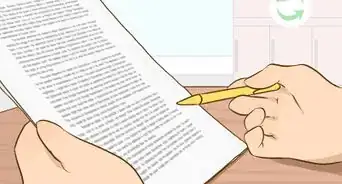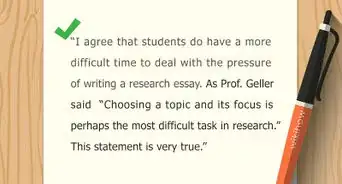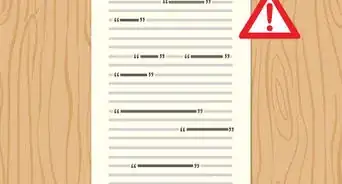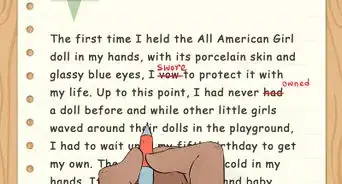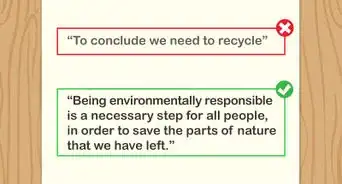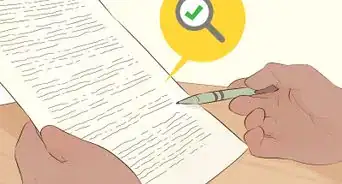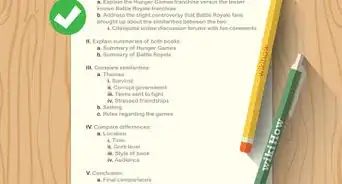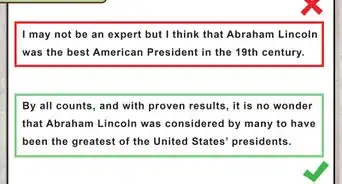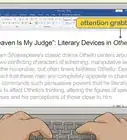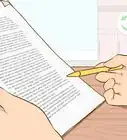This article was co-authored by wikiHow Staff. Our trained team of editors and researchers validate articles for accuracy and comprehensiveness. wikiHow's Content Management Team carefully monitors the work from our editorial staff to ensure that each article is backed by trusted research and meets our high quality standards.
There are 10 references cited in this article, which can be found at the bottom of the page.
This article has been viewed 376,923 times.
Learn more...
It is a familiar situation to many college students: a major paper is due in a few hours and you have not even started! Panic slowly creeps into your bones as you think of your professor’s irritated glare. Never fear— the B.S. isn’t just a degree, it’s an easy way to finish a paper before the impending deadline! You can BS your way through a college paper by getting yourself in the right mindset, crafting a simple but substantive text, and then beefing the essay up with some added jazz.
Steps
Composing a Simple and Substantive Essay
-
1Read the assignment requirements closely. Consult the syllabus or your online course page for information on the assignment. See if it asks you to answer a specific question or explain research you’ve completed. Understanding what your professor requires can keep you on topic and maximize the time you have to write your essay.[1]
- Avoid sending the professor last minute questions about the assignment; it's a dead giveaway you did not do much work.
-
2Develop a plan. Before beginning, write a sensible plan to guide yourself through the paper. Break the essay into manageable parts that you can stick to during your allotted time. Allot specific times based on your strengths and weaknesses in writing. Consider using a plan such as the following:[2]
- 9:00 – 9:30 – Consider paper topic and your argument
- 9:30 – 10:30 – Conduct research.
- 10:30 – 10:40 – Short break.
- 10:40 – 11:00 – Write introductory paragraph.
- 11:00 – 12:15 – Write main body text.
- 12:15 – 13:00 – Write your essay.
- 13:00 – 14:00 – Weave in research and expert opinions.
- 14:00 – 14:15 – Short break.
- 14:15 – 15:00 – Revise and "beef up" your essay with extra text.
- 15:00 – 15.15 – Check your essay for errors and print (or submit if your professor uses an online service, such as Google Classroom).
Advertisement -
3Hook your reader with the introduction. Use the introduction to let your readers know what you’re going to say in the paper. Start with a hook, which grabs your reader’s attention and interest.[3] Make sure to clearly state your argument in simple prose, which is the entire point of the paper. Writing a strong introduction may distract your professor from an otherwise terribly written body.[4]
- An example of a hook could be “A letter from South Africa arrived in Hamburg, Germany during 1945. The message was from Adam Landauer, a German Jew interned in a camp for enemy aliens. An index card, nestled among 50 million other such cards, summarizes what action was taken in response. The location service found his missing brother. Max’s letter showed the importance of tracing agencies to reconstructing Europe after war.”
-
4String together the paper’s body. Allow yourself to free-write the “meat,” or body, of your paper. Build on 2-3 relevant points that you’ve learned in class. Then analyze these points with your thoughts and opinions based on lectures and assigned readings. This can quickly add length to the paper that you can shape with some expert research in the revision process.[5]
- Write simple sentences, which can simply the paper-writing process. For example, you can easily build off of these four statements: “Roman rulers possessed considerable wealth;” “wealthy Romans used aqueducts built with lead before poorer citizens;” “the lead made the Roman leadership crazy;” “the Roman empire declined before aqueducts were widespread.”
-
5Conclude your essay. Revisit what you’ve said in the introduction and body of your paper in the conclusion. Provide a strong impression that you did what you set to do in the paper for your professor by saying things such as, “But Max’s case highlights the binary of humanitarian assistance: it was simultaneously benevolent and political. This challenges earlier scholarship on the apolitical nature of humanitarian aid.” These types of statements may make your professor forget about the haphazard nature of your research and writing.[6]
Beefing Up Your Paper
-
1Use online research tools. Once you have your base paper, use Internet resources to your benefit. Find quotes and research papers from experts on sites such as Google Scholar or Digital Dissertations. Weaving in bits of information and block quotes can bolster your argument and fill out your paper even more.[7]
-
2Incorporate block quotes. As you scour the Internet for research on your topic, look out for beautiful quotes or bits of information. You can paraphrasing or weave them into your paper as a separate block quote. Paraphrasing and block quotes can easily and quickly increase the amount of writing in your paper, getting you closer to the word (or page) limit—and end of your panic![8]
-
3Cite everything. Citations are an important part of any paper that legitimate your work. Cite every fact, quote or block quote you use in the paper. Cite several different works from the same person, which can further beef up your paper. Citations tactics not only can quickly enlarge your paper, but also minimizes the risk of plagiarism.[9]
-
4Use graphics and images. Find pictures and statistical graphics that support or are marginally relevant to your paper topic. Write a couple of separate paragraphs about each graphic or image you use in the paper. The image and your explanation of it can take up a considerable amount of space in the paper, making it easy to BS your way through the writing assignment.[10]
-
5Wield a thesaurus for impressive vocabulary. Make the thesaurus your best friend while you write. Search for longer synonyms for words and phrases that fluff out your paper even more. Using different words and phrases can be the difference in space of “the ways in which” for “how” and “reinforcing patriarchal seigneurial norms” instead of “men rule.” In addition, creative use of vocabulary may distract your professor from other issues with the paper.[11]
- See sentence examples of how those fancy words are used before you use them. You do not want to misuse a word!
Maintaining in the Right Mindset
-
1Do not panic. Getting wildly emotional at this point will hinder your ability to write. Instead, focus on what you can do now, which is to do some triage research and write. Staying positive, keeping up your work flow, and having a little determination can help you go far.
-
2Shut out distractions. Remove anything that may cause your mind to wander. Put away your electronic devices and lists of things to do. Sit away from your TV, phone, or other things you can watch. If you are using the Internet for research, place a block on social media sites for a specific time to prevent the temptation of what your friends are doing. Clearing away potential distractions can ensure you stay focused on getting your paper done.[12]
-
3Feed your brain with a snack. Eat a snack and drink a glass of water every hour. This can refresh your body and mind, helping you to compose a better text in a faster time. Avoid filling up on junk food and caffeine because they may cause you to crash and feel ill. Select the following types of healthy snacks to ensure you have fuel to keep working:
- Piece of cheese
- Fresh fruit or cut veggies
- Hummus
- Yogurt
- A granola bar
- Pretzels
- Mixed nuts
- Peanut butter and jelly sandwich
-
4Take short breaks. After 60-90 minutes of writing, give yourself a 10-15 minute break. Go for a short walk, pace the room, or do some light stretching. Breaks help refresh and refocus your body and mind.
- Avoiding breaks can make you more tired and affect your mood. This is less efficient at composing your paper.
-
5Be realistic on your grade. Keep in mind that BSing for a paper will probably be evident to your professor. They were students once and know most tricks in the book. Recognizing that you probably won’t receive a great grade, which is better than a zero, on a BS paper may make it easier to complete the assignment. It can also make it easier to deal with potentially negative comments from your professor.
Community Q&A
-
QuestionI only have a little amount of information about my essay. What do I do?
 Community AnswerSearch more deeply and think laterally. What analogies can you draw from like areas of the subject matter? Use Google Scholar and library search engines for deeper search tools. You can also try the websites of your favorite newspapers and any sites that specialize in the subject matter, such as centers of excellence or institutes.
Community AnswerSearch more deeply and think laterally. What analogies can you draw from like areas of the subject matter? Use Google Scholar and library search engines for deeper search tools. You can also try the websites of your favorite newspapers and any sites that specialize in the subject matter, such as centers of excellence or institutes.
Things You'll Need
- Study aids from class
- Online research tools
- Quiet place without distractions
References
- ↑ http://www.pitt.edu/~kloman/Anthony/news-paper.html
- ↑ http://www.savethestudent.org/extra-guides/how-to-write-a-3000-word-essay-in-a-day.html
- ↑ http://www.savethestudent.org/extra-guides/how-to-write-a-3000-word-essay-in-a-day.html
- ↑ http://www.writingsimplified.com/2011/06/how-to-write-essay-fast.html
- ↑ http://www.savethestudent.org/extra-guides/how-to-write-a-3000-word-essay-in-a-day.html
- ↑ http://www.pitt.edu/~kloman/Anthony/news-paper.html
- ↑ http://www.savethestudent.org/extra-guides/how-to-write-a-3000-word-essay-in-a-day.html
- ↑ http://www.pitt.edu/~dash/grimmtales.html
- ↑ http://www.pitt.edu/~dash/grimmtales.html
